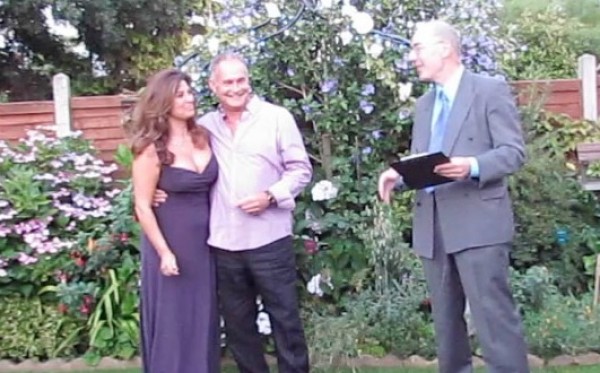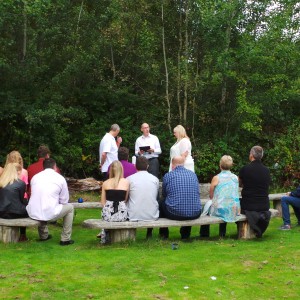by Michael | Oct 28, 2013 | Blog
Regular readers of my blogs will know that I write and conduct personalised life-cycle ceremonies. Not just weddings, civil partnerships, vow renewals, ring blessings, baby-namings and the like, but also funerals.
Cheerful as my blogs tend to be, this one will consider an aspect of death: what do you want to happen to your body at the end?
Of course, this is something I discuss with people (and their families) in their lifetime; I then write the service and eulogy that they actually want.
It’s no more ghoulish than writing a will, and it’s certainly as practical. You’re simply ensuring that your wishes are carried out when you’re no longer around to control things.
Choices
Most people think that a funeral is prescribed. But the only things that actually need to be done when there is a death are legal registration and disposal of the body. Although there are certain stipulations, there is a surprising choice of methods open to you.
The Conventional
Conventionally, you have a religious service delivered by your church, synagogue, temple etc. This will often entail burial, but increasingly nowadays, cremation, and the minister will usually conduct a prescribed service that allows little individuality.
Alternatives
Independent Celebrants
More and more, for those who do not want a full religious service (whether out of respect for the deceased or as the family’s choice) , there is the possibility of a unique, tailor-made service conducted by an independent celebrant. Funeral Directors frequently can recommend such an officiant. The celebrant should visit the next-of-kin and discuss the family’s wishes and learn about the deceased, so as to be able to write an appropriate celebratory service, approved beforehand by the family, and conduct it on the day.
These services are often held in crematoria, but they can take place in cemeteries or natural burial grounds, or even in homes as memorial services.
DIY
There is no space to go into this here, but, as long as pollution and health and safety laws are followed, you can bury someone in your back garden and conduct the ceremony yourself. I don’t recommend it, but, as I have said, there is some freedom as to how – or whether – you conduct a funeral.
Modern alternatives
Wear your beloved!
When your loved one has died, it is possible for their cremated remains (which contain a lot of carbon) to be transformed into precious stones, including diamonds. So your loved one, in the form of a ring or necklace, can still be with you wherever you go!
Give your beloved a real send-off!
Your loved one’s ashes can be sent off into the earth’s orbit or, for quite a price, launched into outer space. I’m not sure about the ‘carbon footprint’ here, but it IS an option …
Become an atoll!
Ashes can be cast into a 100% natural cast reef mould, lowered into the ocean to eventually become a coral reef. Environmentally-friendly and a creative (if expensive?) idea.
All at sea
You can be buried at sea, as in a garden – see above – but there are regulations you need to conform to.
Resomation
Another more environmentally-friendly suggestion is resomation, which is a water-based process which reduces the body to soft bone, easily crumbled. The bone powder can be treated in the same way as cremated remains.
Cryomation
This process uses liquid nitrogen to freeze the body, which is then fragmented, freeze-dried and rendered rapidly compostable in a shallow burial. This must be the greenest process of all.
Cryogenic freezing
Finally, human remains can be frozen, using liquid nitrogen, without damaging human tissue. In theory, the body will be preserved until, with advances in medical knowledge, it will be able to be treated and eventually reanimated.
Take your pick!!
Michael Gordon can help prepare and conduct a tailor-made life-cycle ceremony in or around London or, indeed, in Europe.

by Michael | Apr 30, 2013 | Blog
What’s the point of having an at-home ceremony?
Just book a restaurant, hotel, hot-air balloon, or whatever, for your wedding, vow renewal, handfasting or baby-naming.
You can usually rely on the venue to supply what you have agreed, even though things don’t always run smoothly (when do they?!). But, of course, there is the financial implication to consider.
It can be cheaper to organise an at-home ceremony, although not necessarily.
If you have the wherewithal to do this, do bear in mind that you will need to plan what you’re doing very carefully. However, a home ceremony may yurn out a lot more relaxed, informal and comforting.
Here are some suggestions to make it as stress-free as possible.
Celebrant
As they arrive, it can be nice to introduce those taking part in the ceremony to the celebrant. The celebrant is not there to be an usher or to welcome guests, but these introductions can help put people at their ease.

The venue
Even if you are planning to hold the ceremony outdoors, it pays to have a room available indoors which can comfortably accommodate all the guests, if the weather lets you down.
For an outdoor ceremony, do ensure there are enough chairs (on an even surface) for all the guests. The celebrant will probably want a table, possibly two chairs (the couple may be signing their ceremony certificate) and maybe a paperweight or two. A jug of water plus three glasses would be appreciated, especially in warm weather.
Layout
Obviously, take health & safety into consideration. There needs to be space for people to move around reasonably comfortably, and, potentially, wheelchair access. You won’t want electric cables all over the place to be tripped over, or marquees toppling over in the wind. Make sure all is ready well before the ceremony is due to start. (It is not the celebrant’s job to be moving furniture!)
Distractions
Hopefully, guest behaviour will not be an issue, but I would counsel against serving alcohol before the ceremony.
- If you have domestic animals that could interfere with the ceremony, please ensure that they are shut away.
- If you can, arrange it that your neighbour does not mow the lawn just when the ceremony is taking place, or that he doesn’t leave his dogs at home howling.
- If it is likely to be very hot, try and arrange shade or supply guests with soft drinks before the ceremony .
- Some sort of mini-creche might be a wise option if you are inviting a lot of small children.
Insurance
Do ensure that your domestic insurance policy covers third party liability for any visitors to your home.
Nobody said it was a simple matter to arrange a ceremony at home! However, the rewards can be fantastic. Good luck!
Michael Gordon is a celebrant based in London.
by Michael | Jan 31, 2013 | Blog
I never had any ambition to become a celebrant. (In fact, a year ago I didn’t even know what one was!)
I only heard about it by chance.
If I’m absolutely honest, it all came about because I was interested in 400 prostitutes!
Now don’t get me wrong, please. I am an active man, but not in the way you may be thinking!
I innocently went to hear a talk by somebody who had considerable experience with prostitutes. He had made a fortune many years back by selling answering machines to a niche market nobody had tapped before: prostitutes!
After the presentation, I had a chat with him, and it turned out that he was a celebrant.
He told me that he helped people who wanted a ceremony that was bespoke – not formulaic. He worked with them to construct a ceremony that would mean the most to them (and, hopefully, their guests). It could be religious, semi-religious, non-religious – anything. It could be held anywhere – perhaps a licensed religious building, a hotel, a beach or a mountain top.
The ceremony ranged from wedding, civil partnership, vows renewal, baby-naming or handfasting.
[I’d never heard of handfasting, by the way, but I intend to write a blog about it , so watch this space!]
Anyway, as I listened to David, I got drawn in. This was something different, this was exciting, this was something I could do well (I have considerable experience as a public presenter) and something that would enable me to make a difference to others.
When could I start?!
Well, I trained late in 2012, and was sufficiently enthused that I then decided to train to become a funeral celebrant. I shall be unleashed on the world next month!
Who’d have thought that 400 prostitutes would have made such a difference in my life!
I am a celebrant based in London.


